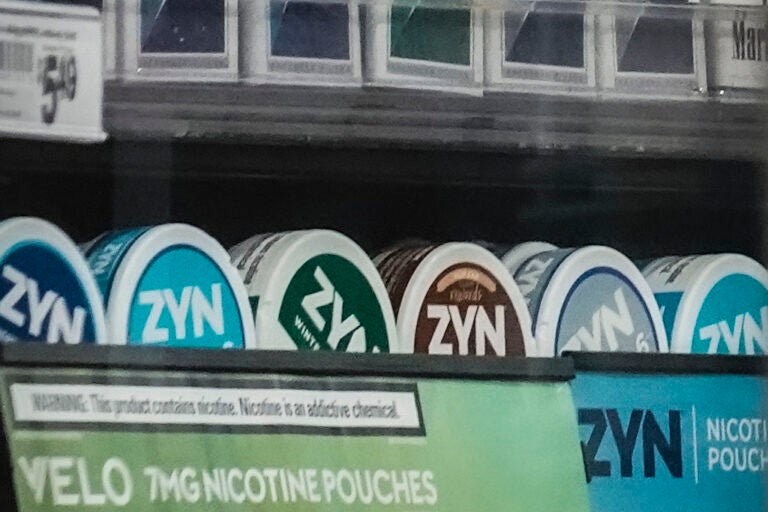FDA regulation of nicotine pouches can help prevent youth use, say Rutgers researchers
Nicotine pouches are a newer class of smokeless products that don’t contain tobacco. Zyn became the first FDA-authorized brand on Jan. 16.
Listen 1:30
FILE - Containers of Zyn, a smokeless nicotine pouch, are displayed for sale among other nicotine and tobacco products at a newsstand on Feb. 23, 2024, in New York. (AP Photo/Bebeto Matthews, File)
From Philly and the Pa. suburbs to South Jersey and Delaware, what would you like WHYY News to cover? Let us know!
The inside of a smoke and tobacco shop in Center City, Philadelphia, was covered wall to wall with various products — traditional cigarettes, vaping pods and cartridges, chewing tobacco and more.
On the front counter, a shelf displayed small round canisters with brightly colored packaging for Zyn, a brand of nicotine pouches. These are a newer class of smokeless products that don’t contain tobacco.
Zyn was just authorized by the U.S. Food and Drug Administration as a less harmful product compared to cigarettes and other smokeless tobacco. It’s the first and only nicotine pouch brand to get this approval to date.
Nicotine pouches are becoming more popular in the United States, data show. They are white, porous sacs about the size of chewing gum pellets and come in flavors like cool mint, citrus, cinnamon and coffee. They’re placed between a person’s lip and gum and slowly release a couple of milligrams of nicotine, the addictive substance found in most tobacco products.
Researchers in the Delaware Valley hope that the FDA’s decision to authorize some pouch brands will lead to stricter oversight of how these products are marketed and sold, and keep them out of the hands of minors.
“I think they have great potential for harm reduction among people who are using more dangerous products, but I think we all agree that young people should not be using any type of nicotine,” said Mary Hrywna, founding member of the Rutgers Institute for Nicotine and Tobacco Studies.
Right now, the use of nicotine pouches among teens remains low. Fewer than 2% of middle and high school students reported using the pouches in the past year, according to the 2024 National Youth Tobacco Survey.
But that can change quickly if federal regulation and enforcement falls flat, Hrywna said. She remembers how e-cigarettes initially came onto the market: rapidly and largely unchecked with marketing tactics that specifically targeted younger people.
“[The FDA’s] inability to issue marketing authorizations on e-cigarettes just allowed the market to explode,” Hrywna said.
The same mistakes don’t have to be made with nicotine pouches, she said. As the FDA approves brands that have submitted marketing applications, Hrywna said the federal agency gains better oversight of those products and can begin to penalize companies that are illegally selling without authorization.
“I think there’s just not an incentive for retailers to carry illegal products if legal products are authorized,” she said. “So, it reduces that potential for growth, too.”
FDA officials noted that the pouches have the potential to help people quit smoking or stop using tobacco products. The pouches also contain lower nicotine doses — Zyn sells them at 3 milligrams and 6 milligrams — and fewer harmful components than other products, so they “pose lower risk of cancer and other serious health conditions.”
But Hrywna said these products are still dangerous and pose a threat to health. They can have side effects including nausea, gum and mouth irritation, headaches and elevated heart rate.
“And again, the dependence on nicotine is not something we want to be encouraging among people that have never used nicotine or tobacco before,” Hrywna said. “With more product availability and more brand availability, I think there are genuine concerns about who has access to the product and who is using it.”

Get daily updates from WHYY News!
WHYY is your source for fact-based, in-depth journalism and information. As a nonprofit organization, we rely on financial support from readers like you. Please give today.




